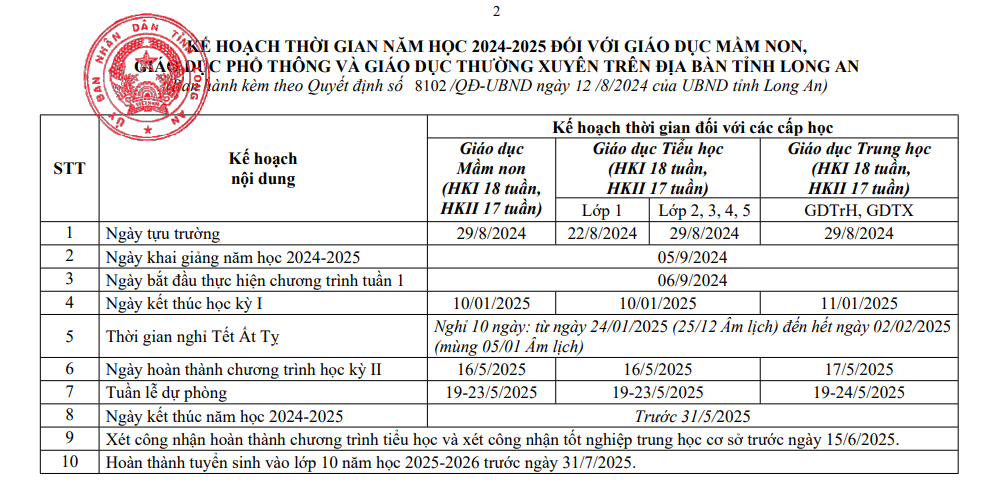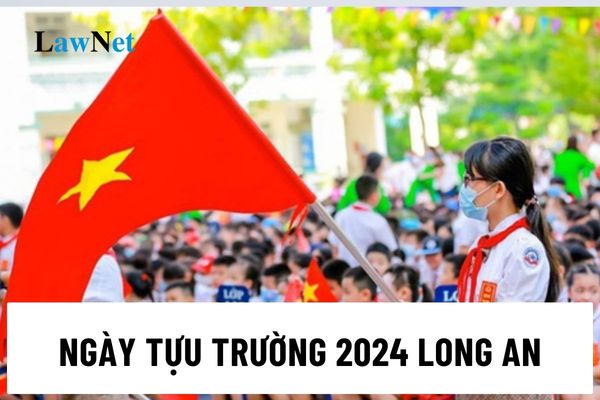Starting Date of the 2024 School Year for Public Schools in Long An
Starting Date of the 2024 School Year for Public Schools in Long An
On August 12, 2024, the People's Committee of Long An province issued Decision 8102/QD-UBND 2024 Download on the school opening dates:

** The school opening date for grade 1 students in 2024 is August 22, 2024; the school opening date for students in other grades is August 29, 2024.**
Additionally, the opening ceremony for the 2024-2025 school year will be held uniformly across Long An province on September 5, 2024. The unified start date for week 1 of the curriculum is September 6, 2024.
Furthermore, the Lunar New Year break for Long An students in 2025 will be 10 days, from January 24, 2025 (Lunar December 25) to February 2, 2025 (Lunar January 5).
Note: The 2024 school opening dates in Long An apply to public schools.

Starting Date of the 2024 School Year for Public Schools in Long An (Image from the Internet)
Do grade 1 students in public schools in Long An receive a tuition fee exemption?
According to Article 14 of Decree 81/2021/ND-CP:
Subjects exempt from tuition fees
1. Public primary school students.
2. Persons studying specialized fields meeting the socio-economic development, national defense, and security needs as prescribed by the Law on Higher Education. Specialized fields are regulated by the Prime Minister.
According to the above regulation, public primary school students are subjects exempt from tuition fees.
Thus, grade 1 students in Long An public schools will be exempt from tuition fees.
What are rights of students in Vietnam?
According to Article 35 of the Charter for Primary Schools issued together with Circular 28/2020/TT-BGDDT, the rights of primary school students are as follows:
(1) Right to education
- Educated and learning to develop comprehensively and maximize their potential; attending a school and class implementing the primary education curriculum conveniently located within the residential area.
- Students can choose or transfer to another school outside the residential area if the school can accommodate them.
- Primary-age students returning from abroad, children of foreigners studying or working in Vietnam, children with difficult circumstances who have not attended school, and who wish to be admitted to a primary school, will be assessed and placed in the appropriate class by the principal.
- Students with disabilities can integrate into a primary school; they are ensured conditions for education and training; they are educated and assessed based on their individual education plans.
- Students can shorten the time for the program, study at an older age, extend their study time, and repeat a grade.
- Students with good physical and intellectual development can advance grades within the scope of the educational level.
The procedure for individual cases is as follows:
Parents or legal guardians submit a request to the school.
The school principal forms a survey and advisory council, including the principal or vice-principal, the Parents' Representative Committee, the student’s current class teachers, the upper-class teacher, health staff, and the Chief of Team.
Based on the council's survey, the principal completes the records and reports to the Head of the Education and Training Department for consideration and decision.
- Students with limited academic performance, who have been guided directly by teachers and parents or legal guardians but still do not complete tasks, according to the level of incompletion, the teacher reports to the principal for consideration of promotion or retention. Together with the family, they decide on appropriate educational measures.
(2) To be protected, cared for, respected, and treated equally and democratically; ensured legitimate rights and interests; provided with complete information about their study and training process; ensured conditions regarding time, infrastructure, hygiene, and safety for studying and training.
(3) To participate in activities that develop individual abilities; express their opinions and aspirations.
(4) To receive scholarships and enjoy social policies as prescribed.
(5) To enjoy other rights as prescribed by law.
According to Article 35 of the Charter for Lower Secondary Schools, Upper Secondary Schools, and Schools with Multiple Levels of Education issued by the Ministry of Education and Training under Circular 32/2020/TT-BGDDT, secondary students have the following rights:
(1) To be equal in enjoying comprehensive education, ensured conditions regarding time, infrastructure, hygiene, and safety for classroom and self-study at home, provided with information on their study and training, and using facilities for educational, cultural, and sports activities as prescribed.
(2) To be respected and protected, treated equally and democratically, have the right to complain to the school and education management levels about decisions concerning them; have the right to transfer schools for valid reasons according to current regulations; to study before the age, advance grades, study at an older age according to Article 33 of the Charter for Lower Secondary Schools, Upper Secondary Schools, and Schools with Multiple Levels of Education issued by the Ministry of Education and Training under Circular 32/2020/TT-BGDDT.
(3) To participate in activities to develop talents in subjects, sports, and arts organized by the school if conditions are met.
(4) To receive scholarships or other allowances according to regulations for students benefiting from social policies, students with difficult lives, and students with special abilities.
(5) To transfer schools if conditions are met according to regulations; the transfer process is in accordance with the regulations of the Minister of Education and Training.
(6) To enjoy other rights as prescribed by law.

